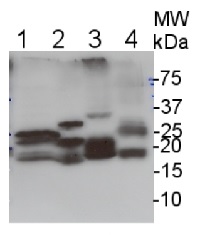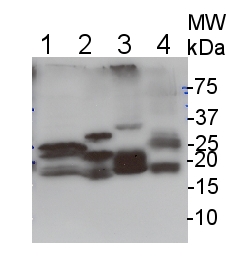1


Anti-Lhc1 | from PSI of red alga
AS08 282 | Clonality: Polyclonal | Host: Rabbit | Reactivity: Diatoms
- Product Info
-
Immunogen: Purified LHC complex from Porphyridium cruentum
Host: Rabbit Clonality: Polyclonal Purity: Serum Format: Lyophilized Quantity: 200 µl Reconstitution: For reconstitution add 200 µl of sterile water Storage: Store lyophilized/reconstituted at -20°C; once reconstituted make aliquots to avoid repeated freeze-thaw cycles. Please remember to spin the tubes briefly prior to opening them to avoid any losses that might occur from material adhering to the cap or sides of the tube. Tested applications: Western blot (WB) Recommended dilution: 1 : 1000 (WB) Expected | apparent MW: 20-25 kDa
- Reactivity
-
Confirmed reactivity: Aureococcus anophagefferens, Guillardia theta, Heterosigma akashiwo, Thalassiosira pseudonana, Porphyridium cruentum Predicted reactivity: Diatoms and other heterokonts, cryptophyte algae, red algae
Species of your interest not listed? Contact usNot reactive in: Higher plants - Application Examples
-
Application example

2 µg of total chlorophyll/lane of total cell extract from (1) Thalassiosira pseudonana, (2) Heterosigma akashiwo , (3) Guillardia theta, (4) Aureococcus anophagefferens, extracted with Agrisera protein extraction buffer PEB, were separated on 13-17% SDS-PAGE and blotted 2h to nitrocellulose. membranes were blocked 1h with 5% low-fat milk powder in PBS-T (0.1% TWEEN 20) and probed with anti-Lhc1 (AS08 282, 1:6000, 1h) and secondary anti-rabbit (1:5000, 1 h) antibody (HRP conjugated) in PBS-T containing 2% low fat milk powder. Antibody incubations were followed by washings in PBS-T (15, +5, +5, +5 min). All steps were performed at RT with agitation. Signal was detected with chemiluminescent detection reagent. Exposure time was 2 min.
Courtesy of Meriem Alami and Beverley Green, Canada - Additional Information
-
Additional information (application): Strongly reactive to 7 Lhc1 light harvesting polypeptides of P. cruentum - Background
-
Background: The light-harvesting system is composed of pigment-binding proteins belonging to the Lhc multigenic family. Lhc polypeptides are able to bind chlorophyll a, chlorophyll b, and xanthophyll molecules in a suitable structural and dynamic mutual arrangement, ensuring high efficiency of energy transfer processes involved in light-harvesting and photoprotection.
- Product Citations
-
Selected references: Tan et al. (1995).Decrease of polypeptides in the PS I antenna complex with increasing growth irradiance in the red alga Porphyridium cruentum. Photosyn. Research 45:1.
Wolfe et al. (1994) Evidence for a common origin of chloroplasts with light-harvesting complexes of different pigmentation. Nature 367:566 - Protocols
-
Agrisera Western Blot protocol and video tutorials
Protocols to work with plant and algal protein extracts
Oxygenic photosynthesis poster by prof. Govindjee and Dr. Shevela
Z-scheme of photosynthetic electron transport by prof. Govindjee and Dr. Björn and Dr. Shevela - Reviews:
-
This product doesn't have any reviews.


